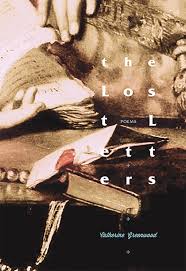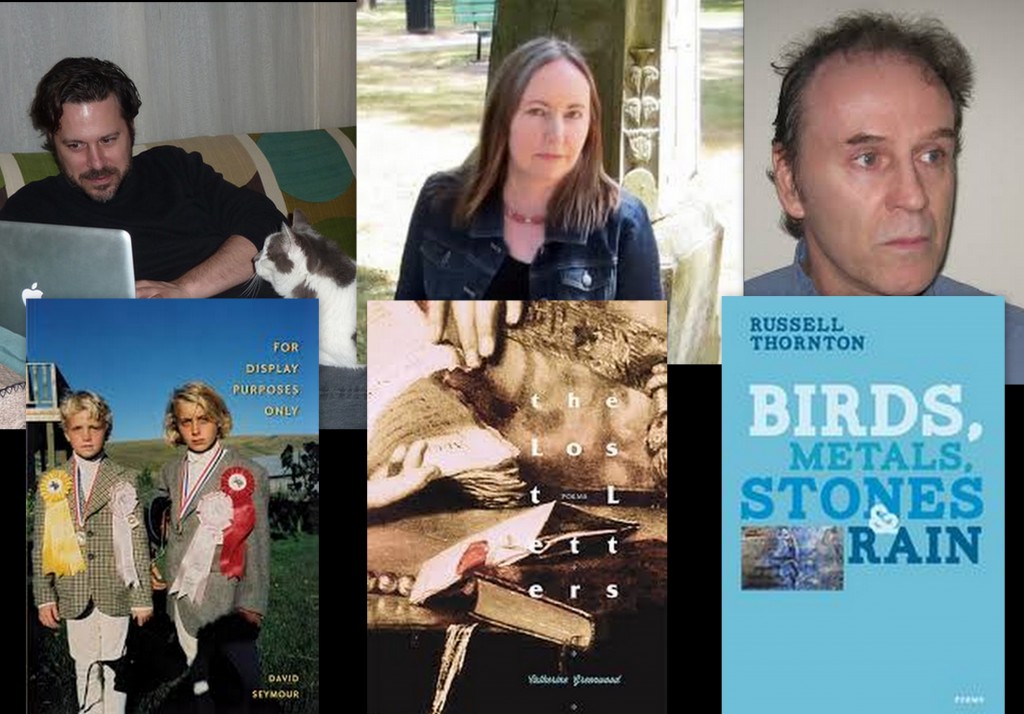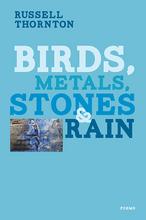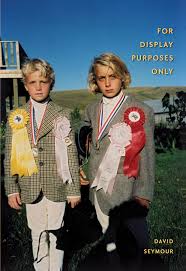The Lost Letters
Catherine Greenwood
Brick Books
88pp; $20
Birds, Metals, Stones and Rain
Russell Thornton
Harbour Publishing
80pp; $16.95
For Display Purposes Only
David Seymour
Coach House Books
80pp; $17.95
I’ve known for most of my life that Americans are woefully ignorant of our great neighbor to the north. I try hard not to be, in part because I live within an easy drive of the Québec border. But I have no real right to be sanctimonious, even with regard to my own calling. Having just (pinch me) turned 71, I find it increasingly hard to keep up with U.S. poetry; some recent Canadian visits, however, have reminded me of my deeper ignorance of Canadian verse, beyond that, say, of my friend John B. Lee and of Don Mckay (two men I admire deeply) and of Anne Carson (a woman who, I admit, mostly baffles me).
 The three books I’ll consider here suggest how much I may be missing. Each is greatly distinct from the others– and each of a very high order. I marvel, for instance, at The Lost Letters (Brick Books) by Catherine Greenwood, whose pivotal section, “Dear Peter,” is prompted by such correspondence between Heloise and Abelard as survives. Many have tried Greenwood’s strategy, but few to my mind have succeeded: she “updates” aspects of an old story, here, so to speak, putting the legendary lovers’ relationship into modern dress.
The three books I’ll consider here suggest how much I may be missing. Each is greatly distinct from the others– and each of a very high order. I marvel, for instance, at The Lost Letters (Brick Books) by Catherine Greenwood, whose pivotal section, “Dear Peter,” is prompted by such correspondence between Heloise and Abelard as survives. Many have tried Greenwood’s strategy, but few to my mind have succeeded: she “updates” aspects of an old story, here, so to speak, putting the legendary lovers’ relationship into modern dress.
This story is famous: Abelard, renowned twelfth-century logician, seduced and impregnated his brilliant student Heloise, whom he spirited away to live with relatives of his. She bore a male child, after which, infuriated by her teacher’s behavior, Heloise’s uncle hired thugs to castrate the scholar. Soon, however recalcitrantly, Heloise became a nun.
So richly detailed and so narratively compelling are these poems that to excerpt from them seems almost an impertinence. But consider this from “Astrolabe,” titled with that bastard son’s name, in which Greenwood conjures a mother lying in her grown boy’s room after he has left her with an empty nest. “Sentimental music,” she testifies, “makes my nipples itch”:
With the clarity peculiar
to us oxygen tipplers I recall
the infamous homemade astrolabe
at our son’s grade eight science fair–
two cardboard circles pinned together
with a grommet, sights drawn
with banana-scented marker
the ensuing kafuffle
when he taught the other children
how to calculate the angles
of Venus and Mars tumbling
in their star-besmirched
quilts.
Her evocation’s sheer sensory accuracy is enviable, but her rendering of motherly love, mixed with anxiety, amusement, frustration, and protectiveness, however obliquely rendered, is more than that– it’s stirring. Whether Greenwood has children or not I can’t say; but she keenly understands, when it comes to one’s offspring, what complexities underlie a parent’s urgent wish that her child have the very best.
The entire Heloise-Abelard portion of The Lost Letters shows Greenwood as above all a supreme chronicler of longings, often as not unfulfilled. In “Same Story, Different Day,” for instance, having cited a fragment of an Abelard letter, including the phrase, “You know what my uncontrollable desire did to you,” Greenwood speaks from the perspective of a young woman whose beloved is in jail. On visiting day, she writes, “We fuck/ each other quickly with our eyes,” and then
…………………..Across
The bare plywood table, my guy
holds my wrists and sneaks
the balloon full of contraband dreams
I smuggled in up my sleeve.
Greenwood’s depiction of the pain of desire– from her opening poem, “Monk’s Blues,” an hilarious and funky monologue by a young woman with a crush, precisely, on an unresponsive monk, through the final section, “Lost Letters,” which presumably derives from her time as a clerk in a thrift store: that sense of unrequited yearning, in a word of loss, is masterful. In “Lost Letters,” say, the speaker of “Charity” recognizes a customer, who may or may not recognize her: “In our grade six pageant I’d played mother/to his pauper.” Real pauper now,
stepped from decades of gleaning gutters,
he’d returned to what was possible, a man
grown into his fate like a foot into a boot…
he’d returned –still short, spunky–to visit
his mom, he said, and hadn’t brought a coat.
To see this derelict, resilient despite his own foiled promise, leads the clerk to recognize that
…my own life had been driven
by small-heeled struggle, the leather scuffed
but snug, and that for a long while I’d been
walking the wrong way in a costume slowly
going out of style.
That last passage, in which the speaker recognizes vulnerabilities far greater than her own, may suggest what makes The Lost Letters such a triumph. Whether she is considering “The Natural History of the Hamster,” the late night wishes breathed into a “Rotary Dial Telephone” (“Double cheese pizza./Something, anything to fill the gap…”), or the profound and balked passions of Heloise and her lover, Greenwood has the heart and humility to see yearning from the inside.
For us humans, it is –is it not?– always a matter of hope and/or its betrayal, love and/or its absence. The first-person narrator of Russell Thornton’s Birds, Metals, Stones & Rain often makes clear that the missing ingredient in his story is the love of a father who deserted him early. He means to compensate that lack by lavishing love on his own children, a daughter and a newborn son. As he says of the latter, “I want this infant/to fight my father for me.”
The sense of betrayal, anger, and loneliness occasioned by his male parent’s leaving is sharp unto excruciating in Thornton’s work. The writer would leave all that behind if he could. But when the noises of a storm sound to the adult like knocks at the door, he says,
………………………….…father, if I let you in,
I would crush your skull the way some men will
an intruder’s, some an enemy’s, some a boy’s.
The blinds, the wind and rain, are actual
banging blinds and wind and rain– before I fall
more asleep, I know it. Still, I want with all my heart,
whatever my heart is, to go the door.
……………………………………………………….(“The Envelope”)
Similarly, when he recalls his father fabricating “Aluminum Beds” and installing them in his sons’ room just before running off, Thornton recalls that
Nightly I allow not one of my brothers
to speak or even audibly breathe. I know
that the sound of any of our young voices
will distract the light trying to make its way
through the fitted substance of the metal. I know
at the same time that this light is my father
searching for his sons.
The desperate wishfulness suggested by the repeated “I know” in that passage is laden for me with pathos, as is the later moment when the poet’s childhood bed seems “a skeleton,”
unending silver, pure and cold, and I become it,
the light of my father’s love arrived at last.
The boy’s delusion is heartbreaking– and yet it turns out in due course to be less than entirely illusory. Again, fatherly love does indeed enter the very being of the poet as he exerts it upon his children.
The moments in which that love manifests itself are so many in this volume that to quote one is to slight others; but for any parent to note this passage from “River Rainbow,” in which the speaker stands at riverside with his two-year-old, who cries boohewun–
Looking back at me
with the grey-blue of the river heron,
one of its feathers fallen into her eyes.
She looks back to the water. Throws a stone
And adds circles within widening circles.
Throws another stone and her irises
halo the river flow. Throws another
and in her pupils the heron opens
its wings and lifts to arc through the blackness
lit blue–
For a parent to note the world’s freshness and sheer availability in the eyes of a child is a poignant experience:
……………………any name
she utters is a rainbow, any bird
she sees is a boohewun, a messenger
carrying to her a name for rainbow,
a heron, and bringing her a heron’s blue.
By focusing on parent-child thematics, I scandalously overlook Thornton’s other significant accomplishments in Birds, Metal, Stones & Rain, not least his spot-on representations of the natural world. Yet because I too am a doting father (and now grandfather, I can’t seem to help myself. Though I was never scarred by a parent’s desertion, I do know the ineffable and unbreachable bond a committed elder feels toward his progeny; and at my age, having watched five children grow and go, I am moved by this much younger author’s sense of time’s velocity, and how it impinges on that bond. In “My Daughter and The Geometry of Time,” he stands with the same child on a beach where he buried the ashes of his grandparents:
I think I will be here at her margins
when I am gone in the same way those two
are now at my own margins, receding
to the beginning…
This is, I think, as much prayer as speculation, the poet keenly aware that, all too soon,
I will see my small daughter gazing back
at me for a moment from where she stands
collecting and pouring the sand, moving
into the future at the speed of light.
Surely that’s one thing that makes parental love so precious, our awareness of how little time we have to offer it in its originative state, primal and primary.
In general, the poems in David Seymour’s For Display Purposes Only are more edgy than others I’ve considered here. I was unsurprised to learn that the poet works in the film industry, because –as his very title may imply– the perceptions he records are somewhat like “takes” in a film shoot. One of the epigraphs of his collection, in fact, is from fellow poet Jay Hopler: “From being to being an idea, nothing comes through that intact.”
In short, this volume emphasizes that our representations (or “ideas”) are inevitably provisory, are, precisely, for display purposes only. There may be some solid ground of being –the opening lines of the first poem are “The best design survives/ a narrative compulsion”– but successfully to figure it in words seems largely beyond us.
To that extent, the identity of the “I” in these poems is obscure, even to the I himself. The cinematic perspective dominates: we are usually acting even when we think we are at our most genuine. Here is a passage from “The Photo Double”:
The cameras, correctly aligned, produce a seamless
Waterline between the shooting tank and the Pacific
Ocean behind it. Cloudy skies are ideal for this illusion.
Study the dailies, learn his moves, I am the mirror left
After the actor has used the mirrors up.
Seymour’s response to the inevitable facticity (as the theorists, on whom more directly, would say) of personality and perception is, however, seldom daunted. It is more likely to be jaunty, even when the material at hand might be shocking or dismaying. “Eyewitness Testimony,” for instance, recounts a murder in a parking lot from the perspectives of various onlookers. But that “The man who was killed died,” as the poem avers at the outset, seems the one unequivocal “fact” in the whole incident.
Consider “The woman at the scene sporting leopard-skin/spandex.” She was
…way too realistic. She lacked
conspicuous panty lines. Her description,
though relevant, was weapon focused.
Elsewhere,
The report from the shots fired was heard variably
As a calendar sliding off a kitchen wall and the after-
vacuum of implosion.
Or
The passing cab driver had the largest
hippocampus among the onlookers, being
the least lost. This was scientifically proven
though need not be mentioned in the final.
And
Others were directionless– what they saw
They now knew had never not happened.
By poem’s end, we cannot even be certain of the incident’s physical details. “(T)estimonials/ hardened into notebook fact,” and yet “Plausible rival hypotheses/ will arise in court.”
Just as everything we do or observe is hypothesis, so is the doer/observer: “That’s me,” the poet writes in the tellingly entitled “The Clones’ Brief Tenure,”, “immortal matter, a smattering of universe made/ coherent by reason.”
There are several clones in the poem just quoted. The third at one point reads the first, who’s apparently a poet:
When I read anaemic verge of yews lamping wiry shade
along the urban growth boundary I read
stand of trees casting shadows on the edge of town
and think I have reduced his thoughts, insulted him,
or oversimplified the yews, but no,
……they have only grown
more complex since he laid eyes on them,
if he saw them at all and they weren’t fabricated
……for the line to convey meaning of
………….another order entirely,
and now I’m stalled on the words, trying to uncover
a clue to the yews’ reality, a stark hint of certitude…
As it turns out, it is not only what, elsewhere in the poem, Seymour calls his “suppositious self” that is endlessly clone-able but also the world that we wrongly imagine to be intact and, as we like to say, factual. As my dear friend, the superb poet Fleda Brown, has written,
Poets/fictionists are liars. They make things up as they go along. So? Language can never tell the “truth.” So? I’m reminded of the French critics of the past 20 years, who very accurately noted (in ridiculously convoluted language) that language has no intrinsic meaning. That the author is dead. The reader makes up the stories in a negotiation between mind and page. So?
I have also long felt that, once one penetrates the explorations of the theorists, one arrives, as Brown implies, at conclusions that the average writer will have discovered within a few months of applied authorship. How much more fun it is to find these “truths” enacted by a poet of David Seymour’s manifest talent than to find them emphasized in studiously and gracelessly unreadable prose.
I challenge you: Search the theoretical pantheon, from Heidegger to Derrida to Lacan to Lyotard and on and on, and find me something as delightful as this:
When I tell you I love you
you smile like
our old television advertising
a clearer HD television.
Ms. Greenwood and Messrs. Thornton and Seymour present us, variously, with persona poems, impassioned “realist” testimony, and postmodern (brilliant) japery. Let us Americans jettison our odd provincialism. If we look north of the border, we’ll find a little –or in fact a lot– of something for each of us.
—Sydney Lea
Sydney Lea is Poet Laureate of Vermont. He founded New England Review in 1977 and edited it till 1989. His poetry collection Pursuit of a Wound (University of Illinois Press, 2000) was one of three finalists for the Pulitzer Prize for poetry. Another collection, To the Bone: New and Selected Poems, was co-winner of the 1998 Poets’ Prize. In 1989, Lea also published the novel A Place in Mind with Scribner. His 1994 collection of naturalist essays, Hunting the Whole Way Home, was re-issued in paper by the Lyons Press in 2003. Lea has received fellowships from the Rockefeller, Fulbright and Guggenheim Foundations, and has taught at Dartmouth, Yale, Wesleyan, Vermont College of Fine Arts and Middlebury College, as well as at Franklin College in Switzerland and the National Hungarian University in Budapest. His stories, poems, essays and criticism have appeared in The New Yorker, The Atlantic, The New Republic, The New York Times, Sports Illustrated and many other periodicals, as well as in more than forty anthologies. His selection of literary essays, A Hundred Himalayas, was published by the University of Michigan Press in September, and Skyhorse Publications recently released A North Country Life: Tales of Woodsmen, Waters and Wildlife. His eleventh poetry collection, I Was Thinking of Beauty, was published in 2013 by Four Way Books.




Russell Thornton’s book is a gem. Each poem displays his care and great gift. There is such a rigorous intelligence at work in this book and a huge generous heart (though hurt…).